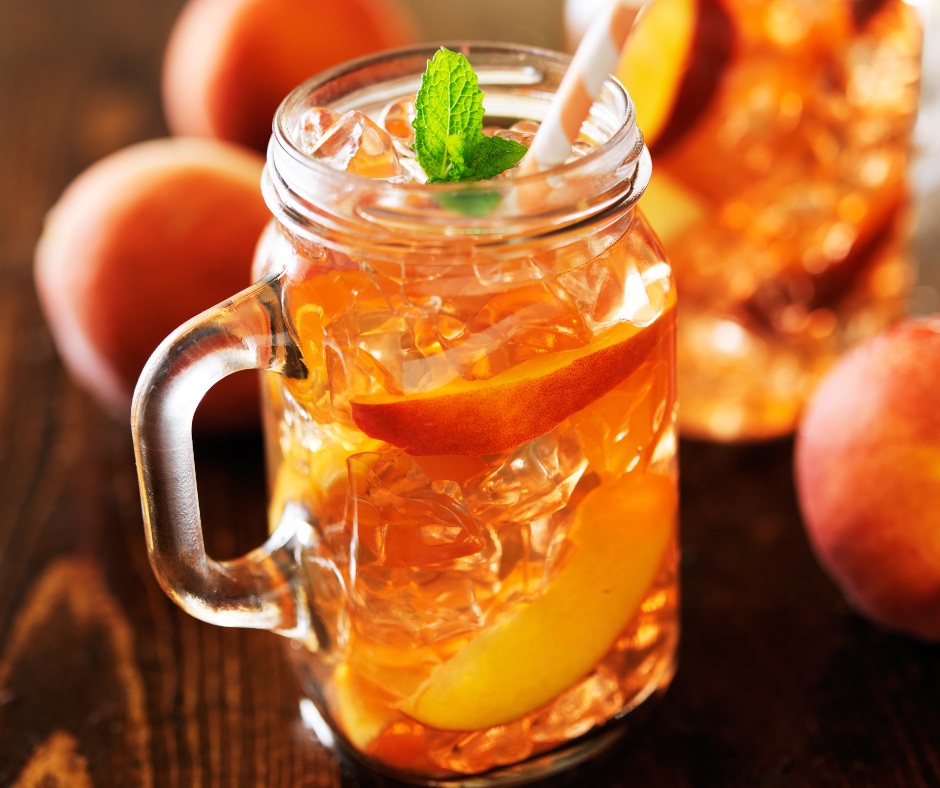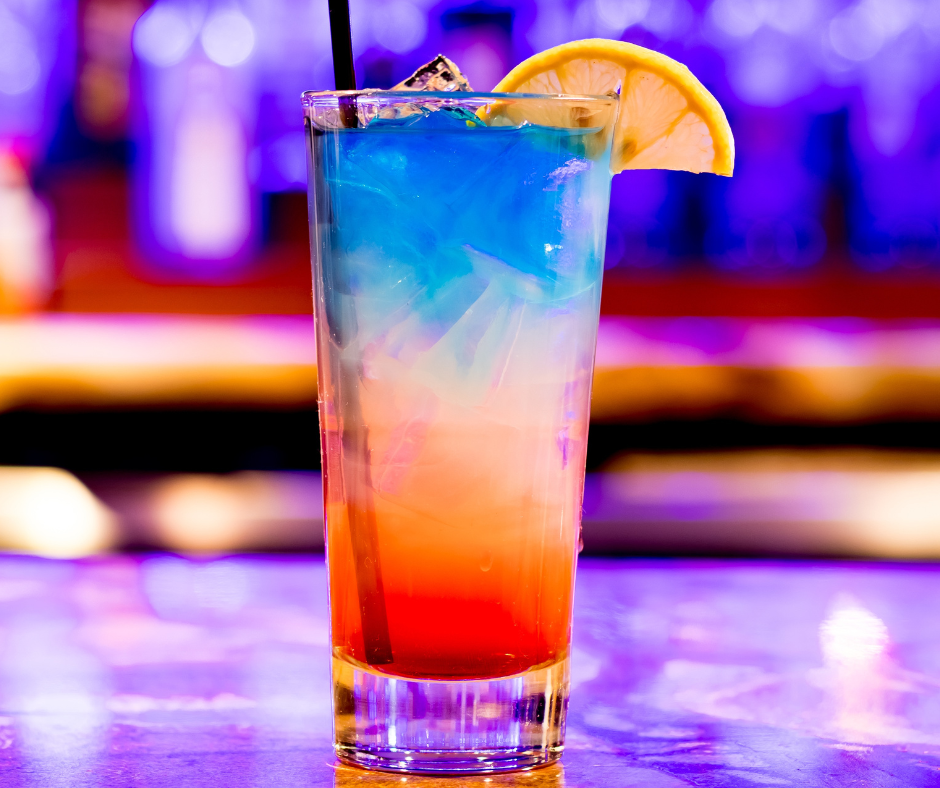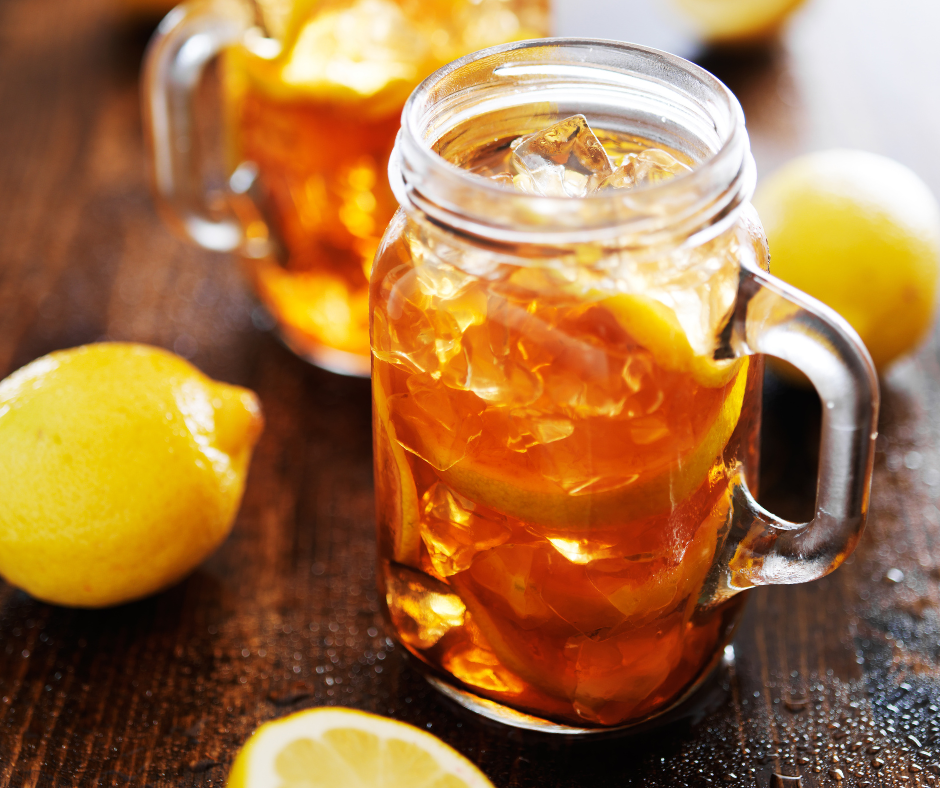Introduction
Sweet tea and soda are popular beverages enjoyed by many Americans. However, both contain excessive sugar, which can negatively affect one’s health. This blog post will explore ‘Is Sweet Tea Better Than Soda?‘ and explain why excessive sugar consumption harms our health. We will also offer some suggestions for healthier alternatives to these beverages.
Overview Of The Debate: Sweet Tea Vs. Soda
Although many people may think sweet tea is a healthier alternative to soda, the truth is that the two are quite similar when it comes to sugar content and negative health effects. Sweet tea is a sugar-sweetened beverage (SSB), just like soda, as defined by the Centers for Disease Control and Prevention (CDC). Sweet tea may have marginally less sugar and calories than soda, but it can be just as bad in the long run when it comes to chronic disease development, obesity, and overall well-being.
Both sweet tea and soda have been linked to increased risk of obesity, type 2 diabetes, heart disease, and stroke. These drinks can also contribute to tooth decay and cavities. According to the American Heart Association, women should consume 6 teaspoons or 24 grams of added sugar daily, while men should consume no more than 9 teaspoons or 36 grams daily. A single can of soda or glass of sweet tea can contain up to 10 teaspoons of added sugar, far exceeding daily recommendations.
Why Is The Excessive Consumption Of Sugar Bad For Our Health?
Excessive sugar consumption can cause inflammation in the body and lead to several negative health outcomes. Consuming too much sugar can contribute to weight gain and obesity, which can increase the risk of developing chronic diseases such as type 2 diabetes and heart disease. Eating too much sugar can also damage the liver and lead to insulin resistance, which can cause a range of health problems. Additionally, consuming sugary beverages like sweet tea and soda can lead to tooth decay and cavities, as the sugar feeds bacteria in the mouth that produce acid.
Considering these negative health effects, it is important to consider healthier alternatives to sweet tea and soda. Some healthier beverage options include unsweetened tea or coffee, water with lemon or other fruit added for flavor, or sparkling water with natural flavors. Reducing or eliminating sugary drinks from one’s diet can help improve overall health and reduce the risk of chronic disease.
In conclusion, sweet tea and soda contain excessive sugar that can negatively affect our health. It is important to recognize the potential harms of these beverages and consider healthier alternatives. Reducing or eliminating sugary drinks from our diets can improve our overall health and well-being.
What Is Sweet Tea?
Definition Of Sweet Tea
Sweet tea is a popular beverage in the Southern United States made by steeping tea leaves in hot water and adding large amounts of sugar while the tea is still hot. The resulting mixture is then chilled and served over ice. Sweet tea is typically made using black tea, but variations made with green and herbal teas also exist.
How Is It Prepared?
Black tea leaves are steeped in boiling water for several minutes to make sweet tea. Then, while the tea is still hot, large amounts of sugar are added and stirred until dissolved. Finally, the sweetened tea is poured into a pitcher and chilled in the refrigerator until cold enough to serve over ice. Some variations of sweet tea may also include other flavorings such as lemon, mint, or peach. However, the addition of sugar is what gives sweet tea its characteristic sweet, refreshing taste.
What Is Soda?
Definition Of Soda
Soda, also known as carbonated soft drink, is a beverage that dissolves carbon dioxide gas in water and adds flavors and sweeteners. Soda drinks can come in various flavors, including cola, lemon-lime, orange, root beer, ginger ale, and grape. The carbon dioxide that is dissolved in the water is what gives soda its characteristic fizziness and carbonation.
How Is It Produced?
Carbon dioxide is first added to water under high pressure to produce soda. This creates carbonic acid, which gives the drink its tangy taste. Flavors and sweeteners are added, and the drink is bottled or canned. Some sodas may also contain caffeine and preservatives to extend their shelf life. However, the high amount of sugar and calories in soda has been linked to numerous health problems, including obesity, diabetes, and tooth decay.
Compared to sweet tea, soda contains high amounts of sugar and calories, which can negatively affect one’s health if consumed regularly. While both drinks have drawbacks, healthier alternatives such as water, unsweetened tea, or flavored sparkling water exist. These alternatives provide refreshment without the excess sugar and calories. It is important to be aware of the amount of sugar and calorie intake and make conscious decisions to maintain a healthy lifestyle.
Nutritional Value Comparison
Sugar And Calorie Content In Sweet Tea Vs. Soda
Regarding sugar and calorie content, sweet tea and soda are quite similar. Sweet tea is made by adding large amounts of sugar to hot tea and then chilling the mixture. Soda dissolves carbon dioxide gas in water and adds flavors and sweeteners.
A 12-ounce soda can contain 140 calories and up to 40 grams of sugar, while 12 ounces of sweet tea from a popular chain restaurant contains 130 calories and 34 grams. These amounts are equally unhealthy and can cause inflammation when consumed in excess.
Is Sweet Tea Better Than Soda?
Both sweet tea and soda are unhealthy in excess, as they can lead to weight gain, tooth decay, and chronic health issues such as diabetes and heart disease. But Is Sweet Tea Better Than Soda? The answer is that choosing one “healthier” option between the two is tough, as they both contain large amounts of sugar and empty calories.
Alternative And Healthier Beverage Options
To maintain a healthy lifestyle and reduce sugar and calorie intake, it is recommended to consume alternative and healthier beverage options. Water is always a great choice and helps to keep the body hydrated. Unsweetened tea is also a good option that provides the refreshing taste of tea without the added sugar. For those craving carbonation, sparkling water can be a healthier alternative to carbonated soft drinks.
To conclude, while sweet tea and soda are both unhealthy beverage options when consumed regularly, there are healthier alternatives that individuals can choose from to maintain a healthy diet. It is essential to be aware of the sugar and calorie contents of the beverages one consumes and make conscious decisions to maintain a healthy lifestyle.
Health Risks Associated With Consumption
High Blood Sugar And Obesity
Regular consumption of sweetened beverages is associated with increased sugar intake, leading to elevated blood sugar levels. High blood sugar can increase the risk of developing obesity and other related health issues. Studies indicate that the consumption of sugary drinks contributes to an increase in abdominal fat, leading to metabolic syndrome and other health problems.
Risk Of Developing Diabetes And Heart Disease
The high sugar content in sugary drinks can lead to type 2 diabetes due to insulin resistance. Consuming sugar-sweetened beverages regularly can also lead to an increased risk of developing heart disease, as it contributes to high blood pressure and dysfunction in blood vessels.
Impact On Oral Health
Sugary drinks can damage teeth through their high sugar content and acidity levels. Frequent consumption of sweetened beverages can lead to tooth decay and cavities, causing oral health problems. A study published in the US National Library of Medicine found that frequent consumption of sugar-sweetened drinks led to a 73% higher chance of tooth wear in daily consumers than occasional consumers.
It is important to limit the consumption of sugary drinks and substitute them with healthier alternatives to reduce the risk of these health issues. Healthier options include water and unsweetened tea, which provide hydration without added sugar and calories. Sparkling water and water infused with fruit can also be refreshing substitutes for sugary drinks.
In summary, the consumption of sugary drinks can lead to several adverse health effects, such as high blood sugar, obesity, diabetes, heart disease, and oral health problems. Limiting or avoiding these beverages and opting for healthier alternatives is crucial to maintaining overall health and well-being.
Sweet Tea And Soda Addiction
Addictive Properties Of Sugar
Sweet tea and soda both contain high amounts of sugar that can lead to addiction. Sugar activates the brain’s reward centers, which release dopamine – the feel-good chemical. The more sugar consumed, the more dopamine is produced, leading to an addiction cycle. This addiction can be difficult to break, as the body craves the temporary pleasure associated with sugar consumption.
How To Break The Addiction Cycle
Breaking the addiction cycle of sweet tea and soda consumption can be challenging, but it is essential to promote overall health and well-being. One way to start is gradually reducing the frequency and quantity of sugary drinks consumed. This will allow the taste buds to adjust to beverages with lower sugar content. In addition, replacing sugary drinks with healthier alternatives like water, unsweetened tea, or fruit-infused water can help break the addiction cycle.
Another effective way to break the addiction cycle is by addressing the underlying causes of sugar cravings. These can include stress, fatigue, and inadequate sleep. Addressing these causes makes it easier to resist the cravings for sugary drinks.
In conclusion, sweet tea and soda consumption can lead to addiction due to the high sugar content and its effects on the brain. Breaking the addiction cycle requires a gradual reduction of sugary drinks, replacement with healthier alternatives, and addressing the root causes of sugar cravings. By taking these steps, individuals can reduce the risks associated with sugar consumption and promote overall health and well-being.
Caffeine Content
How Much Caffeine Is In Sweet Tea Vs. Soda Vs. Coffee?
Caffeine is a stimulant in many beverages, including sweet tea, soda, and coffee. Some individuals rely on caffeine to boost their energy, while others may avoid it due to its side effects. Understanding the caffeine content of these beverages can help make informed decisions about caffeine consumption.
Sweet tea contains approximately 34.5mg of caffeine per cup, while sodas like Coke and Mountain Dew contain 25 and 39mg, respectively. Green tea contains a similar amount of caffeine as sweet tea, with approximately 28.4mg per cup. In comparison, coffee made from grounds contains significantly more caffeine, with approximately 95mg per cup.
Effects Of Caffeine On The Body
Caffeine can affect the body in various ways, both positively and negatively. It can help increase alertness, improve cognitive performance, cause jitteriness and anxiety, and disrupt sleep. However, the effects of caffeine can differ among individuals, depending on their tolerance and sensitivity.
Individuals sensitive to caffeine may want to limit their sweet tea, soda, and coffee intake to avoid unpleasant side effects. Pregnant women and those with medical conditions such as heart disease or high blood pressure should also limit caffeine consumption.
In conclusion, sweet tea and soda contain moderate amounts of caffeine compared to coffee. While caffeine can have positive effects like improved alertness, it can also cause negative side effects, particularly for individuals sensitive to caffeine. Understanding the caffeine content of beverages and its effects on the body can help make informed decisions about caffeine consumption.
Which One To Choose?
When choosing between sweet tea and soda, there are several factors to consider. Both beverages are known for their sweet taste, but one may be a better choice, depending on personal preferences and health concerns. Here are some things to consider:
Factors To Consider When Choosing Between Sweet Tea And Soda
Calorie and sugar content: Both sweet tea and soda contain high amounts of sugar and calories, which can contribute to weight gain and other health problems if consumed in excess. However, depending on the recipe and brand, sweet tea may have slightly fewer calories and less sugar than soda.
Caffeine content: Sweet tea and soda contain caffeine, affecting energy levels and overall health. Sweet tea has a moderately lower amount of caffeine than soda but still contains enough to impact the body.
Nutritional value: Neither sweet tea nor soda offers significant nutritional value, as both are considered “empty calorie” beverages. This means they provide calories without beneficial nutrients like vitamins or minerals.
Moderation Is Key
While sweet tea and soda can be enjoyable in moderation, limiting consumption is important to avoid negative health effects. Both beverages are high in sugar and calories, and consuming too much can lead to weight gain, diabetes, and other health issues. It’s recommended to choose water, unsweetened coffee or tea, or low-calorie beverages over sweet tea and soda when possible.
In conclusion, sweet tea and soda are both high in sugar, calories, and caffeine, making them less-than-ideal beverage choices for daily consumption. However, if indulging in a sweet beverage, it’s important to moderate intake and limit consumption to avoid negative health effects.
Conclusion
Now you should know the answer to ‘Is Sweet Tea Better Than Soda?’. After considering the factors involved in choosing between sweet tea and soda, it’s clear that neither beverage is the healthiest choice. They contain high amounts of sugar and calories and offer little to no nutritional value. While sweet tea may have marginally fewer calories and less sugar than soda, it can still have negative health effects when consumed regularly.
Summary Of Findings
Studies have shown that both sweet tea and soda can contribute to weight gain, diabetes, and other health problems. They are both considered sugar-sweetened beverages and offer no significant nutritional value. While sweet tea may have slightly fewer calories and less sugar than soda, it is not a healthy choice for everyday consumption.
Recommendations For A Healthier Lifestyle
Limiting or avoiding the consumption of sweet tea and soda is recommended to promote a healthier lifestyle. Opt for water, unsweetened coffee or tea, or low-calorie beverages instead. These options are not only healthier, but they also provide more beneficial nutrients for the body.
In conclusion, while sweet tea and soda may be enjoyable as an occasional treat, moderation is key to avoiding negative health effects. Individuals can improve their health and well-being by choosing healthier beverage options and limiting sugar and calorie intake.
FAQ: Is Sweet Tea Better Than Soda: Health Comparison
Q: Is sweet tea better than soda?
A: Sweet tea and soda are equally unhealthy when comparing the sugar content and calories. Both are categorized as sugar-sweetened beverages and can contribute to chronic disease development and negatively impact your overall well-being.
Q: Is there a significant difference between sweet tea and soda’s sugar content and calories?
A: The difference between sweet tea and soda regarding sugar and calories is marginal. While sweet tea may have slightly less sugar and fewer calories than soda, both drinks still contain significant sugar.
Q: How does the caffeine content in sweet tea and soda compare to coffee?
A: Compared to coffee, sweet tea, and soda contain less than half the caffeine. One cup of coffee from grounds contains approximately 95mg of caffeine, while soda and sweet tea contain around 30-40mg per serving.
Q: Are there any healthier alternatives to sweet tea and soda?
A: Yes, there are plenty of healthier beverage alternatives. Drinking water, sparkling water, herbal tea, coconut water, and freshly squeezed juices are all great options. These alternatives are much healthier than sugary drinks and help keep you hydrated.

Deb Carlson at Crosslake Coffee: Join Deb at Crosslake Coffee for a delightful blend of community, caffeine, and creativity. Discover the cozy ambiance and warm hospitality that make this local coffee shop a beloved gathering spot. From expertly crafted espresso drinks to mouthwatering pastries, Deb invites you to savor every sip and bite. Stay connected with the latest updates on specials, events, and live music performances by following Deb Carlson at Crosslake Coffee on social media. Embrace the vibrant online community and share your love for great coffee and good company with fellow enthusiasts. Don’t miss out on a moment of the Crosslake Coffee experience – connect with Deb on social media today.



